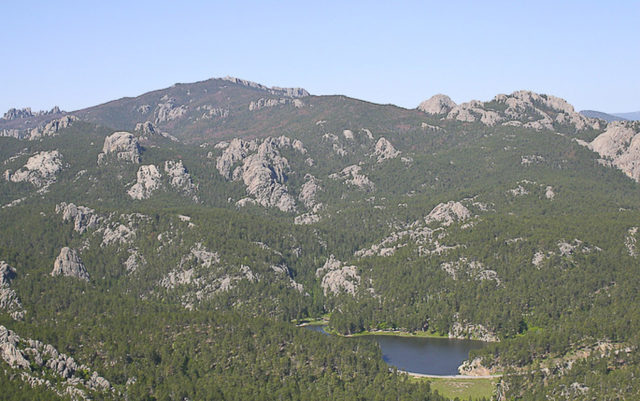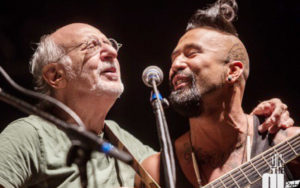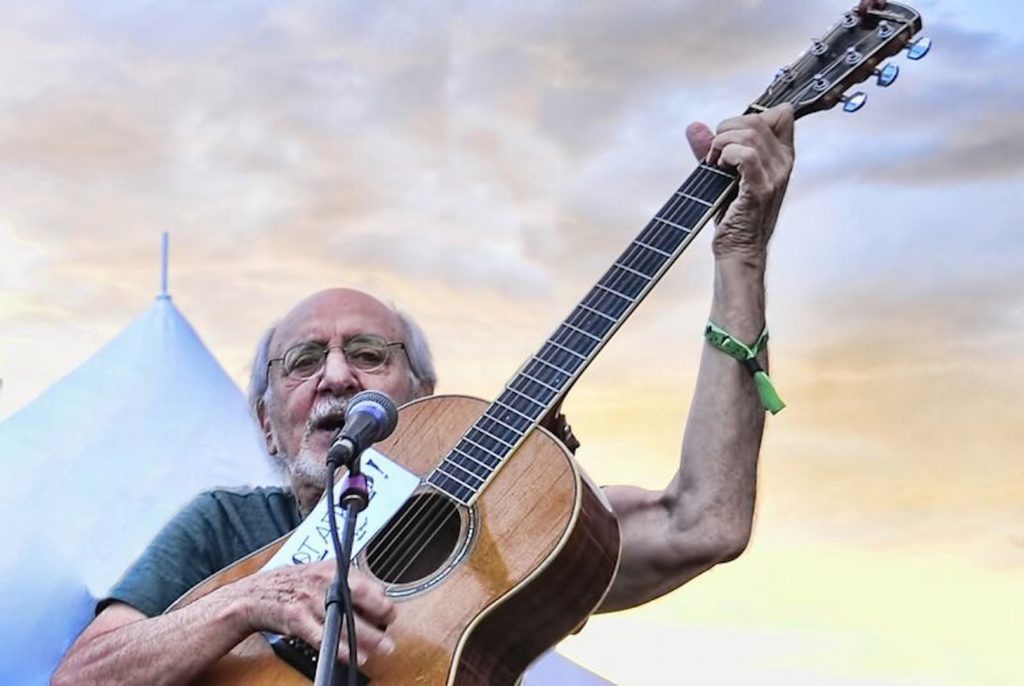
In 1868, the U.S. government, representing all of us, signed the Treaty of Fort Laramie with native peoples including the Oglala, Brule and Miniconjou bands of the Lakota people along with the Yanktonai Dakota and Arapaho Nation.
The Treaty did several things.
It brought an end to the fighting between the U.S. government and Red Cloud, a leader of the Oglala who had defeated the U.S. Calvary several times during a two-year period of violence from 1866 to 1868. The fighting concerned the Powder River lands of Wyoming and Montana.
The Treaty also created a reservation that included the Black Hills of South Dakota along with sizable parts of the Powder River lands.
And finally, it gave those reservation lands to the native peoples mentioned above … forever.
But “forever” tends to be a controversial word when it comes to the U.S. government and Native Americans. It seems to mean a lot of things but very rarely does it actually mean forever.
In the case of the Fort Laramie Treaty, it meant nine years.
For the Native Americans represented by the Treaty, the Black Hills were, and still are, the center of their spiritual world, a sacred place upon which their culture and quality of life depends.
For the U.S. government in 1868, the Black Hills meant nothing. This was long before anyone had carved the heads of presidents into the area’s granite mountain tops.
But in 1874 everything started to change. The infamous Lieutenant Colonel George Armstrong Custer led a reconnaissance mission into the Black Hills and reported to Washington D.C. that miners who had illegally trespassed into the Black Hills region of the reservation had found gold. Custer’s report created a flood of illegal miners to the area, which resulted in escalating tensions between the indigenous people who actually owned the Hills and the trespassing white men looking to strike it rich by blowing them up.
As Native Americans began to fight for their sacred lands, people began to die. By 1876, newspapers were calling it the “Great Sioux War.”
In June of that year, Sioux leaders Sitting Bull and Crazy Horse defeated Custer at the Battle of the Little Big Horn in what would become known as Custer’s Last Stand.
Then in 1877, as a result of the escalating violence, which had been initiated by the miners’ disregard of the Treaty’s conditions, “forever” came to an abrupt end.
The U.S. government seized the Black Hills from the native people who had always lived there and who had been granted legal title to the area in perpetuity just nine years earlier.
This illegal seizure of sacred native lands for the purpose of opening up the gold fields is a dark chapter in American history and an injustice that the land’s true guardians have been fighting to reverse ever since. What is perhaps most surprising is the level of success their efforts have had to date.
In 1980, the Sioux Nation finally had its day in court and won. The U.S. government was ordered to pay the Sioux Nation $15.5 million — the determined market value of the land in 1877 — plus an additional $105 million representing 103 years worth of interest on the original amount.
But there was just one problem; the Black Hills were as sacred to the Sioux in 1980 as they have always been. So, of course, they said “no” to the money in 1980 and they are still saying “no” to the money today, which, due to continuing interest accrual, has now swelled to more than $1.4 billion.
Turning down such an enormous sum is a particularly bold move for an impoverished people who average less than $7,000 per family per year on the Pine Ridge Reservation in South Dakota.
But the Sioux Nation’s resolve is clear and simple to understand. The Black Hills were never for sale, are still not for sale, will never be for sale, and they want them back. They don’t want our money. They want their sacred lands, which were legally confirmed to be theirs in 1868. And they need them back because their culture has been suffering for generations because of the absence of the one place that connects them to each other and the earth in a profound way.
Those asking to have their sacred lands returned understand that many privately owned parcels now exist in the area in question and as a result, have made it clear they will settle for the return of only the publicly owned lands.
It seems a reasonable request considering that our own court system, in modern times, has acknowledged that the land was wrongfully confiscated by the federal government, which it ordered to finally pay for the unjustified taking.
Native Americans are not alone in thinking that the return of the Black Hills is the right thing to do. Today, there is a broad coalition of people and organizations who support the Black Hills Initiative, as the effort to return the public lands of the Black Hills to Native Americans is known.

This coalition of concerned citizens of all races and cultures will once again be coming together in the Black Hills this September 9 to 11 for a three-day celebration of music, environmentalism, social justice and Native American culture for the 2016 Black Hills Unity Concert.
This will be the third such gathering since the inception of the Unity Concerts in 2014. And this year, as in years past, the three-day event is open to anyone and absolutely free of charge.
One of the many musicians who has participated in the The Black Hills Unity Concerts since their inception is longtime singer/songwriter and political activist Peter Yarrow of Peter, Paul and Mary fame. I recently asked him why he was so involved in this particular issue.
“One of the great burdens of the United States comes from our need to heal the wounds inflicted on populations who were injured because they were viewed as inferior or slaves or just an impediment to settling land, ” he says.
When it comes to Native Americans, Yarrow says, “It was clear genocide, without question … and we need to directly deal with the legacy of what we’ve done to native people otherwise we are just another hit and run driver. So we have to ask where and how does the United States stand up.”
Yarrow believes that giving the Black Hills back to Native Americans is not only the right thing to do, but also an important step in healing our nation.
“Respecting the treaty of 1868 will pave the way for us to do the right thing in many other areas,” he says. He equates it to the importance of the historic Supreme Court decision upholding gay marriage, which he refers to as “a miracle.”
“Healing comes through love,” he says. “This is important to me. I need to stand up and say I am sorry and I pledge myself to trying to do something to heal the multi-generational wounds we have caused.”
As it always does, Yarrow’s optimism that the world is truly capable of great progress comes through in his words and sincere belief that eventually the federal government will give the Black Hills back to their rightful guardians.
And why shouldn’t he be an optimist on such issues? He has been fighting for civil rights and a wide variety of social justice issues for more than 60 years, and while he knows that change doesn’t happen over night, he has certainly experienced his share of victories in that time. That’s why he truly believes that the Black Hills Initiative will be another such victory.
“I believe [these efforts] can lead to the kind of coalescence of the Lakota Sioux that will allow them to bring this issue to the Obama administration so that he could give the Black Hills back in his last year,” Yarrow says.
But if that doesn’t happen, he says the struggle will continue for as long as it takes.
The Black Hills Unity Concerts are also about other issues impacting all of our cultures. They are about preserving all sacred sights for all indigenous peoples around the world. And with the help and vision of Yarrow’s daughter Bethany, the gatherings have become centered on the crossing points of environmental, economic and racial justice as well, which explains the involvement of both environmental groups and Black Lives Matter.
“We are headed toward pell-mell cataclysmic climate change,” says Yarrow, noting that indigenous people are fighting to stop fracking and pipelines just like the people of Colorado.

So how can a three-day event with a wide variety of musical and spoken word performers and speakers be offered to the public free of charge? The simple answer is because of people like you.
All the performers and staff volunteer their time. As for securing a location and stage and camping area etc., there are regional fundraising events like the benefit being held in Boulder this Sunday, July 10.
So if you think that returning the Black Hills to their rightful guardians is a good idea, then come hear more about it along with some inspiring music by Peter Yarrow, The Earth Guardians, The Cody Blackbird Band and Lyla June Johnston this Sunday night at the Unity of Boulder Spiritual Center. Tickets are $30 and the money goes to support The Black Hills Unity Concert in September. There will also be a silent auction.
For more information on The Black Hills Unity Concert or its benefit concert in Boulder, go to theunityconcert.com.
On the Bill: Peter Yarrow, The Earth Guardians, The Cody Blackbird Band and Lyla June Johnston. 5 p.m. Sunday, July 10,
Unity of Boulder, 2855 Folsom St., Boulder, Tickets $30. Money goes to support The Black Hills Unity Concert.














